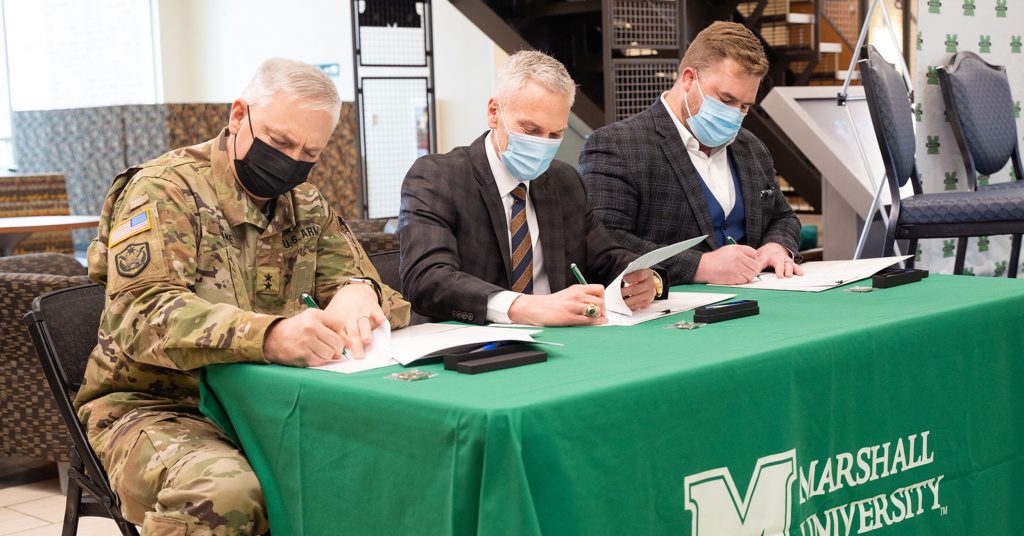Above: Signing ceremony at Marshall’s Weisberg Applied Engineering Complex
Marshall University’s Institute for Cyber Security (ICS) is teaming up with the West Virginia National Guard and Forge Security LLC to enhance cyber security efforts and strengthen the future of cyber security professionals.
The partnership was announced Wednesday, following a “live fire” cyber range training session in Marshall’s Weisberg Applied Engineering Complex. Forge Security conducted the training for the West Virginia National Guard, focusing on industrial control systems. Marshall cyber security students had the opportunity to follow along through the exercise to see how working practitioners respond to these types of attacks.
“Marshall University is proud to collaborate with our West Virginia National Guard and Forge Security on what will become a tremendous benefit to all of us,” said Marshall University President Brad D. Smith. “This partnership will establish a solid foundation aimed at protecting and defending unauthorized cyberattacks across West Virginia and beyond and provide incredible experiences for our students.”
Marshall’s affiliation with the West Virginia National Guard and Forge Security in the area of cyber security is “a great relationship and will do wonders to support cyber security readiness in the state,” said Dr. Dave Dampier, director of Marshall’s Institute for Cyber Security. “We look forward to long and fruitful partnerships in cyber security.”
These partnerships represent a tremendous benefit to the students, the university, the state and beyond, said John Sammons, associate director of Marshall’s Institute for Cyber Security.
“The partnership with the West Virginia National Guard is a perfect complement to our recent selection as a member of the U.S. Cyber Command Academic Engagement Network (AEN),” Sammons said. “This is going to further our ability to help tackle the cyber security problems facing the Department of Defense and other organizations throughout the country. It’s critically important for any good cyber program to be grounded in reality. This relationship will do that for us. The West Virginia National Guard has a lot of real-world experience in cyber and we want to benefit from that.”
The partnership with Forge and its cyber range is a game-changer for Marshall’s academic programs, Sammons said. The cyber range enables Marshall to incorporate immersive, realistic, hands-on exercises into its curriculum, including individual lab exercises to teach specific skills as well as live fire exercises that simulate an actual cyberattack. Employers need new hires that are as close to job ready as possible, and this is precisely what the cyber range experience provides, making Marshall one of a relatively small group of universities that provides this kind practical, hands-on experience, Sammons said.
The value of having a trained and capable cyber force cannot be understated in today’s world, said Maj. Gen. Bill Crane, the adjutant general of the West Virginia National Guard.
“We truly understand the need for collaborative training opportunities among our soldiers, airmen and academic institutions such as Marshall University,” Crane said. “I have no doubt that this venture will be beneficial for the men and women of the National Guard and will bolster our ability to refine cyber skills, build a talent pool and provide a response capability for the state of West Virginia. I look forward to seeing the success stories that will come from this endeavor.”
Securing the country from retaliatory cyber activities is “absolutely critical,” said U.S. Sen. Shelley Moore Capito, R-WV.
“The threat we face from cyberattacks will continue, and Marshall’s program is preparing the next generation of guardians who will protect us from these electronic assaults,” Capito said. “The training and experience of this ‘live fire’ cyber range will keep the students and professionals engaged and help them keep us safe from this known threat. The better we prepare our defense, the better we will be able to continue to benefit from the many technological innovations that touch every aspect of our lives. I’m proud to continue my support for these efforts at Marshall.”
Justin Jarrell, founder and CEO Forge Security, said he co-founded Forge Cybersecurity because he’s passionate about helping small businesses protect their livelihoods against cybercrime.
“And I’m just as invested in the next generation of cyber security professionals,” Jarrell said. “That’s why we’re thrilled to partner with Marshall University and the West Virginia National Guard to support cyber security research and innovation with this one-of-a-kind program.”
Forge serves as a local provider of a cyber range platform developed by the international company Cyberbit.
“Preparing next-generation cyber defenders requires rethinking training and education,” said Adi Dar, CEO of Cyberbit. “Cyberbit built the range for Forge to address the cyberskilling needs of cyber security professionals and Marshall University students. Forge leads the region in cyber security training and services to meet the needs of enterprise and government entities.” Marshall’s Institute for Cyber Security brings together the university’s cyber experts – including hardware and software engineers, forensic scientists, cyber security practitioners and policy experts — to address emerging needs in cyber security through multidisciplinary, cutting-edge research, education and outreach programs. The Marshall faculty’s breadth of cyber security expertise crosses extends across different colleges at the university, and the institute, launched in the fall of 2021, helps Marshall pool and maximize its offerings for students to ensure they meet their unique career goals.
